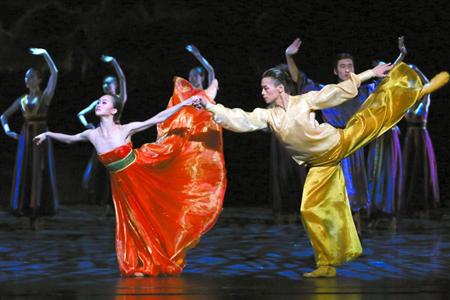2008 (1762)
2009 (1498)
2010 (796)
2011 (759)
2012 (633)
2013 (449)
2014 (575)
2015 (323)
2016 (276)
2017 (470)
2018 (127)
2023 (1)


真得演得很好, 沒抱希望去看, 隻是想借此機會學習中國古典, 並介紹給孩子, 我自己本來至少一半是衝著音樂去的, 一進劇院坐下, 舞劇一開始就被深深吸引:舞台布置簡潔古樸,有的時候配上燈光又華麗無比, 音樂讓人都不覺得這是在中國, 倒是很西亞, 不過也沒什麽, 古代大唐不是很受西域影響嗎?其實那是一個我們聽說過但陌生的國度, 我們現代中國人除了懂幾首古代唐詩, 還懂其他嗎?
這部舞劇幾乎是西方人理解和表達的 《長恨歌》, 除了舞蹈演員是中國人, 舞編舞台布置燈光服裝都是老外, 或者幾乎多是法國人, 音樂也是, 特別是Armand Amar的, 很中東詩情畫意, 他音樂中的西域悲情, 是那片土地和天空的, 中東曆史悠久, 中東不等於伊斯蘭。
Jaya Ibrahim, 印尼人, 世界知名的室內設計大師,負責舞台布置, 很遺憾他2015年5月份突然去世, 未能看到最終的演出, 但他的才華卻不可磨滅.....
還有日本鼓, Kodō (鼓童?) is a professional taiko drumming troupe. Based on Sado Island, Japan, they have had a role in popularizing taiko drumming, both in Japan and abroad. They regularly tour Japan, Europe, and the United States. In Japanese the word "Kodo" conveys two meanings: "heartbeat" the primal source of all rhythm and, read in a different way, the word can mean "children of the drum".
好像有聽到 波蘭作曲家 Henryk Górecki的 "Sorrowful songs", 人類悲哀的感受都一樣嗎?
還有Philip Glass 的音樂,總有一種泉水溪流般的清新和氧氣,去除繁瑣有反複循環的清新, 能量和熱情, 我跟女兒說Philip Glass 曾經研究過印度教,印度音樂,她說難怪音樂有印度的味道, 我怎麽沒聽出來印度味道呢?
舞蹈演員跳得很出色又很鎮靜, 一反中國戲劇舞劇上習慣的熱鬧, 舞台布置也不是那麽中國化, 沒有什麽時間地點講故事套話, 幹淨幽遠的舞台布置, 讓人更注意欣賞舞蹈演員的用芭蕾語言去刻畫 一代國君唐明皇和國色國香楊貴妃的愛情故事, 和靈魂追隨。楊貴妃最後被唐太宗放棄而大度視死如歸,演的很好
可以說, 這是一台國際化的 《長恨歌》, 不僅僅是屬於中國的了, 已經是全人類的了, 或許當中國人一提起唐太宗會批評他為什麽沉溺女色而喪失江山,對他們的故事已經不感興趣,而西方人倒有興趣研究他們為什麽這對靈魂老要在一起, 活著和先後離世後,
舞劇的最後是唐太宗的忠實隨從在那轉一個東西:燈光一打, 雪花從天而降, 唐明皇和楊貴妃又在天上會和了
看完演出後, 女兒說沒想到演得這麽好, 她給10 out of 10, 確實是挺好的,難道是音樂是西方人導演的原因嗎??
************************************************
Echoes of Eternity is co-produced by the Shanghai Grand Theatre and Shanghai Ballet.
Creative team:
Choreographer: Patrick de Bana
Set designer: Jaya Ibrahim
Costume designer: Agnes Letestu
Light designer: James Angot
Scriptwriter: Jean Francois Vazelle
Literature Consultant: Sifu TANG
Assistants to Choreographer: Jean Marie Didiere, Attila Istvan Bako
Music: Armand Amar, Ravia Goldschmidt, Kodo, Henryk Górecki, Philip Glass
Dancers:
Emperor: WU Husheng
Lady Yang: QI Bingxue
Moon Fairy: ZHAO Hanbing
Gao Lishi: ZHANG Yao
Chen Xuanli WU Bin
An Lushan ZHANG Wenjun
ECHOES OF ETERNITY is based on one of China’s greatest love stories: that of the Emperor Tang Xuanzong and his favourite concubine, Yang Yuhuan. In the early half of his reign (712-756) Emperor Tang Xuanzong – the seventh (and longest reigning) emperor of the Tang Dynasty – was a diligent ruler and was credited, along with an astute team of advisors, with pushing Tang China towards new heights of economic and international powers. Although he had many concubines, consorts and even wives during his reign, he fell hopelessly in love with 18-year old Yang Yuhuan, the wife of one of his sons. Yang Yuhuan was known as one of the Four Beauties of Ancient China and when the Emperor ordered her to leave his son, she retired to a nunnery…but not for long. The Emperor soon made her his favourite consort and they lived happily together in his later years. The love story quickly captured the imagination of the public and of writers of Chinese and Japanese literature but then tragedy struck: during a rebellion, as the Emperor and his entourage were fleeing imminent attack, his guards turned on him and blamed the rebellion on Lady Yang’s family…the young woman was so distraught and knew there was only one thing she could do…
(https://www.londontheatre1.com/news/137494/shanghai-ballet-echoes-of-eternity-london-coliseum/)



